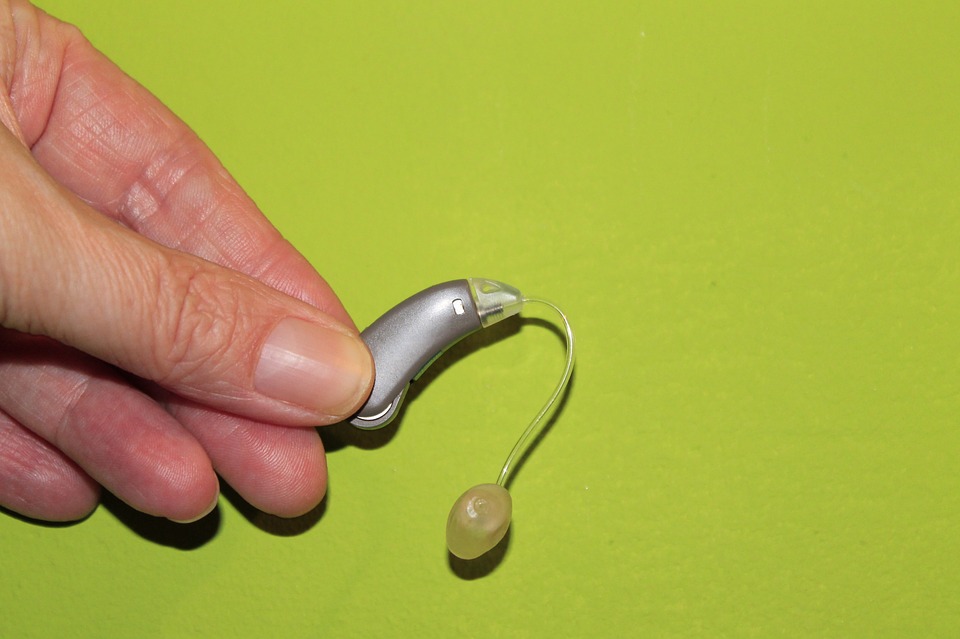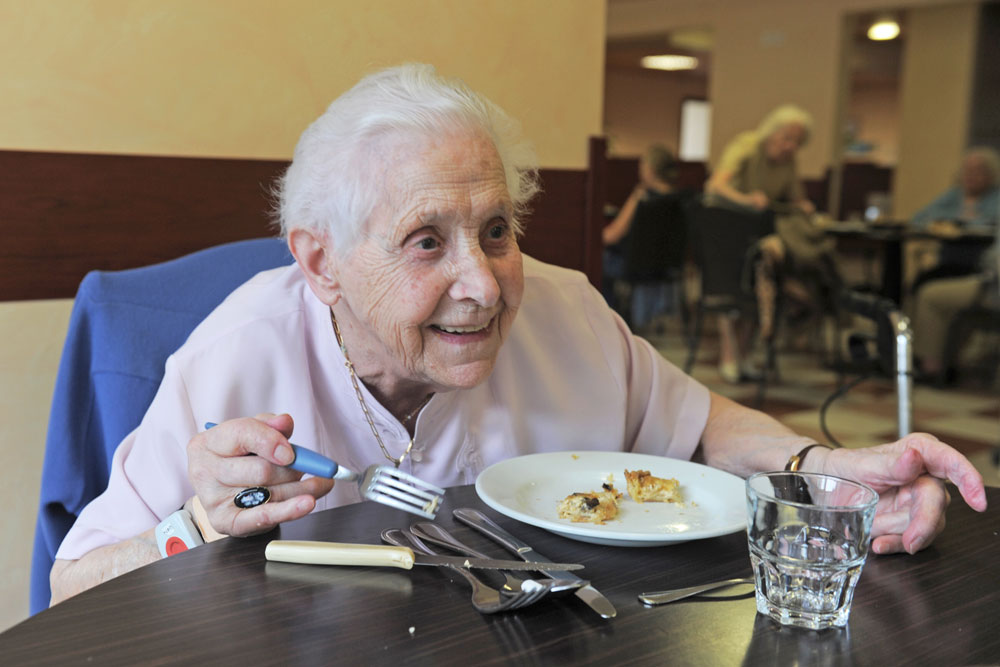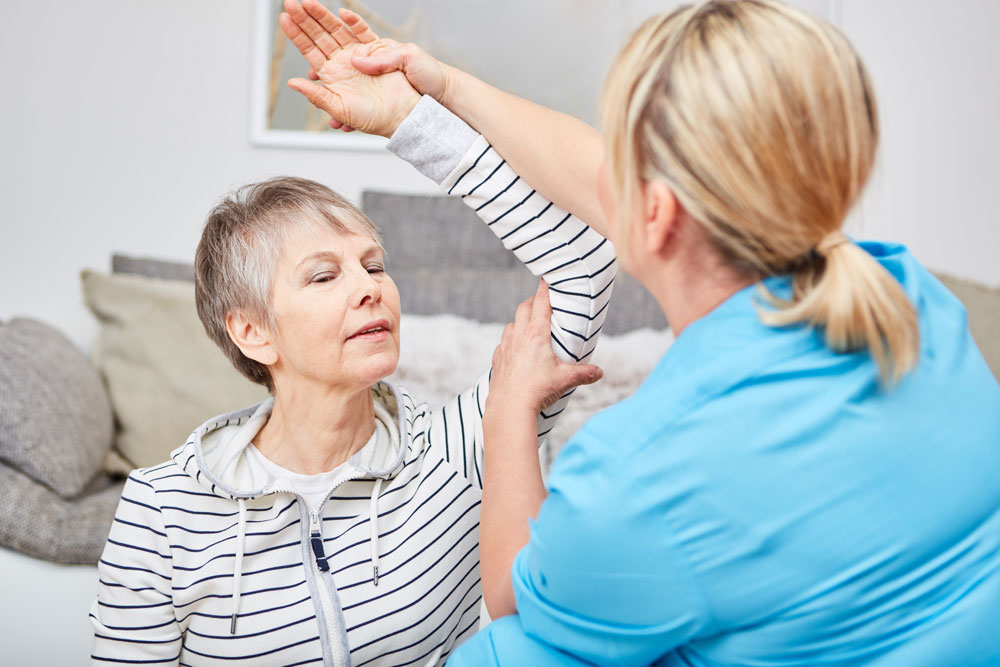For those who depend on visual and hearing aids, it is important that they are functional.
This digital article based on Swedish conditions is computer translated. Hopefully we can inspire people from other countries.
Many elderly people depend on glasses to see well. Not as many use hearing aids. There are many other visual and hearing aids that can make everyday life easier for our residents. For example, there may be hearing aids for TV, hearing loops and special magnifying glasses for the visually impaired. Glasses and hearing aids can help make everyday life work and make sense.

Sight and hearing are essential for us to be able to orient ourselves in everyday life. Glasses must be clean and fit the person who owns them to be useful. Vision changes during aging, regular eye examination is necessary. If someone has eye drops, these should be given as prescribed.
Impaired vision
It happens that the residents have dirty glasses. Anyone who wears glasses knows how vision is affected when they are dirty. In addition, the lens of the eye will cloud with increasing age, leading to cataracts. For the resident, this can mean that it becomes doubly cloudy and even more difficult to focus and see. Cataracts can be operated on.
Sight is of great importance to our well-being. There are elderly people who have limited finances and refrain from eye examinations. The tear fluid also changes. This can cause the eyes to become dry. It can cause discomfort such as chafing and burning. Follow-up of vision and eyes is included as a preparation for the annual doctor's visit.
Impaired vision has consequences for the quality of life. It can impair the ability to fend for oneself, for example pressing buttons, and thus create insecurity in social contacts. Poor vision can contribute to fall injuries. Being able to read or watch TV counteracts isolation from the outside world. Glasses are included in a reasonable standard of living and those who cannot afford it can apply for social benefits to get an eye examination and new glasses.
Vision changes often come stealthily. For the resident, it is not easy to get to the optician to get new glasses. When examining medical records, information is sometimes missing on both whether the resident has glasses and when they last visited an optician.
One way to reduce the consequences of visual impairment is to have well-thought-out lighting. Older apartments can be dim and often have uneven lighting. Especially in the dining room, good lighting can improve the appetite. We eat with our eyes. White cloth and bright interior details can help to create light in the room.
Poor lighting can cause headaches and tired eyes. Disturbing light such as flickering light tubes can create anxiety and worry. There may be a need to block bright sunlight outside, no one wants to be blinded by the sun.
Many opticians today have equipment so that they can examine the vision of people who cannot fully participate in an eye examination. Cataracts and dry eyes can be treated and it can be good to remind relatives that it can be good to go to an optician.
What are the most common causes of impaired vision in the elderly?
The most common causes of vision loss in the elderly include age-related macular degeneration, glaucoma, cataracts, diabetes-related eye problems, and hereditary factors.
How can I recognize signs of impaired vision in an elderly relative?
Signs of impaired vision may include difficulty reading, increased dependence on bright light, difficulty recognizing faces or objects, and frequent falls or bumps due to lack of spatial orientation.
What opportunities are there for eye examinations and evaluation of the vision of residents of the nursing home?
Nursing homes should offer support in carrying out regular eye examinations carried out by an optician or eye specialist. These examinations can detect and monitor any vision problems.
Which aids and techniques are available for the elderly with impaired vision?
Assistive devices include glasses, magnifying glasses, electronic reading aids and talking books. Elderly people with impaired vision can also benefit from simpler adaptations such as increased lighting and the use of contrasting colors.
How can the nursing home support the residents with impaired vision in everyday life?
Nursing homes can support residents by providing lighting that is sufficiently bright and even, creating simple and clear signs and markings, and offering objects with tactile qualities to facilitate recognition.
Are there strategies to facilitate communication with elderly people with impaired vision?
Yes, strategies include using clear and slow speech, describing visual details verbally, using non-verbal communication such as gestures and touch, and offering alternative communication such as Braille or talking clocks.
How can I help my elderly relative with impaired vision to feel more independent and included in the nursing home?
You can help by supporting the use of assistive devices, providing emotional support and encouraging participation in adapted activities and social interactions at the nursing home.
If you or your elderly relative have additional questions or concerns about low vision and its management in the nursing home, consider contacting an optician, eye specialist or nursing home staff for more specific information and advice.
Hearing impairment
Many older people have impaired hearing and sometimes have hearing aids. A good sound environment affects the quality of life for those with impaired hearing. If someone has a hearing aid, it must work to be useful.
Hearing loss always affects communication between people. By showing consideration and following some simple advice, you can make things easier for those with a hearing loss.
• Look at the person you are talking to. Make sure it's bright so your face can be seen.
• Be close to the person if necessary.
• Speak clearly, but don't shout.
• Repeat or say the same thing in different words if the resident does not understand.
• Ask open-ended questions if you are unsure whether the resident has understood
• Avoid talking to several people at the same time.
• Reduce disturbing car noise by closing the door and TV.
• Check daily and if necessary that the hearing aid is working. Try to learn how to care for it, so you can help.
• Keep in mind that the hearing aid does not provide normal hearing.
• Have paper available, write down if necessary.
• Important information is always given in writing.
There must be care instructions for how to clean the hearing aid, how to check or replace the batteries and how to set the volume. If the hearing aid is not used, if the batteries are dead or if it is misadjusted, it does no or less good for the resident.
For various reasons, hearing impairments can be experienced so severely that they trigger crisis and grief reactions. Functional impairments can be shameful and a conversation about a hearing impairment can feel uncomfortable for the resident.
Disturbing sounds can create stress and discomfort. Chairs without paws that squeak, TVs with a TV shop or gossip radio with commercials that nobody listens to. Someone is standing and talking on the phone without moving to the side. It can create stress if it's a workplace, but even worse if it's in my home and I can't do anything about it. Take a tour of the premises and think about how it sounds.
In some places, a quiet conversation is taking place that involves the residents, their relatives and the employees. Maybe you sing songs together or talk about the past. Many small efforts can create well-being.
Sometimes when I've visited nursing homes, the radio blares with Calm favorites or some residents sit lined up in front of a TV set that broadcasts TV Shop or other bland programs. Is it music or programs that the residents themselves have chosen?
What is the sound like when the TV/radio is not on? Is the sound environment dominated by clattering crockery, fans, lifts, scraping from chairs or by one of the residents defecating? Is there an interesting conversation or sing-along going on? Is the sound environment harmonious? What is it like to live next door to a person who is confused and screams at night?
Small simple tricks can change the sound image completely. For example, sitting down and talking to the person who is worried or spontaneously singing carols. Putting paws on the chairs so they don't scratch the floor and using fabrics and art to improve the acoustics. It requires some thought and planning, but not any big investment.
What are the most common causes of impaired hearing in the elderly?
The most common causes of hearing loss in the elderly include age-related hearing loss, exposure to loud noises during life, hereditary factors, and medical conditions such as diabetes and high blood pressure.
How can I recognize signs of hearing loss in an elderly relative in a nursing home?
Signs of hearing loss may include the older person often asking to repeat what is said, having difficulty following conversations in noisy environments, turning up the volume on the TV or radio, and appearing isolated due to difficulty communicating.
What opportunities are there for hearing tests and evaluation of hearing for residents of the nursing home?
The nursing home should offer hearing tests and evaluations that can be performed by a hearing specialist or audiologist. They can be used to determine the degree of hearing loss and suggest appropriate measures.
Which aids and techniques are available for the elderly with impaired hearing?
There are various aids and technologies that can be helpful, including hearing aids, hearing loops, hearing implants, and sound amplifiers. The use of these aids should be discussed with a hearing care professional.
How can the nursing home support the residents with impaired hearing in everyday life?
Nursing homes can support residents by offering adaptive technology, such as hearing aids and hearing loops, ensuring that communication is clear and using written information when necessary. They can also organize activities that promote social interaction and inclusion.
Are there strategies to facilitate communication with elderly people with impaired hearing?
Yes, strategies include speaking clearly and slowly, using non-verbal communication such as gestures and facial expressions, and minimizing background noise in the environment. Sign language and written communication can also be used if necessary.
How can I help my elderly relative with impaired hearing to feel more included in the nursing home?
You can help your relative by supporting and encouraging the use of hearing technology, attending meetings with hearing care professionals, and informing staff about their communication needs and preferences.
Understanding and managing hearing loss in elderly nursing home residents is critical to ensuring their well-being and quality of life.
Reflection - sight and hearing
Care staff:
• Do you have good routines to see that the residents have clean glasses?
• Do you have residents with a hearing impairment?
• Have you found good ways to communicate?
• Are there instructions for how any hearing aids should be taken care of?
Manager, nurse, occupational therapist and physiotherapist:
• Is follow-up of vision included in your annually recurring work?
• Does it happen that the elderly cannot afford new glasses?
• How do you work with the sound environment?
• Do those with hearing loss have working and correctly adjusted hearing aids?
Resident and next of kin:
• Does your loved one see well with their glasses?
• Does the accommodation have a good sound environment?
• Does communication take place well and clearly?
Erland Olsson
Head nurse
Sofrosyne
Better care every day
Aktuellt i media
- 2024-04-22 04:00 01 Kvalitet
- 2024-04-18 04:00 10 Aktivitet o funktionsbevarande arbetssätt
-
2024-04-15 04:00
09 Mat och måltid
Food and fall prevention. How the nursing home ensures a safe and nutritious food handling.
info Foto: Mostphotos
Foto: Mostphotos - 2024-04-11 04:00 05 Planering
- 2024-04-08 04:00 10 Aktivitet o funktionsbevarande arbetssätt
- 2024-04-04 04:00 11 MTP






